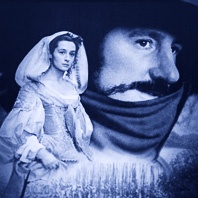The death of Cyrano in the full moon light

Cyrano de Bergerac (1619–1655) was a French writer, who was less famous for his own pieces [*], but better known through the writings about him by Edmond Rostand (1868–1918) from 1897. The piece was called just like himself »Cyrano de Bergerac« and premiered as stage play in Paris in the same year.
Up until today, it has been staged and filmed many times. The movie that is surely most famous is the one with Gerard Depardieu in the leading role from 1990. All dialogues are versified, which lends everything a historicising but also an intense, poetic effect.
To quickly summarise, it is about the said Cyrano de Bergerac, who suffers under his gigantic nose and who, during the course of the story, opposes everyone with sword and magniloquence, who dares to attack his honour or his political aims. Then he falls head over heals in love with his cousin Roxane (who incidentally gave the movie version with Steve Martin of 1987 its name), but keeps his feeling a secret for fear of rejection. At that, he supports the handsome but simple lad Christian by composing love letters and words to Roxane in his name, whereupon she marries Christian, in the belief that he was the creator. Even beyond Christian’s death, Cyrano conceals the truth to his beloved, that he wrote all those words and letters. Only in his hour of death he admits the truth. The full moon plays an important role in this closing scene.
Initially, Cyrano’s confidant Le Bret pointed out the Moon to him, which shone down through the trees at them, and denotes the Moon as his friend [the movie does not contain this passage, however it contains the full moon – in the clip at 10:50 min]:
LE BRET
(lui montrant le clair de lune qui descend à travers les branches)
»Ton autre amie est là, qui vient te voir !«
CYRANO
(souriant à la lune)
»Je vois.«[LE BRET
(Points to the rising Moon which begins to shine down between the trees)
»Your other friend is looking at you.«
CYRANO
(Smiling at the Moon)
»I see.«]
After that, Cyrano talks about a moonbeam in the face of his death, which catches him and wants to take him away from the Earth [in the clip at 11:38 min]:
CYRANO
»… Mais je m’en vais, pardon, je ne peux faire attendre
Vous voyez, le rayon de lune vient me prendre ! … «
[Well, I must go – pardon – I cannot stay!
My moonbeam comes to carry me away.]
This love story belongs to the most beautiful and most powerful that has ever been written. On one hand, due to the beauty of its language, on the other hand, because of the topic of relinquishing and remaining silent about your own feelings, which painfully brings home to people the value of love. This truth contains a lot of power.
The Moon is our witness …

[*] By the way, the writer Cyrano also occupied himself with the Moon, just as in his work »L’histoire comique contenant les états et empires de la lune« [Funny stories of states and empires of the Moon] from 1650, where he undertakes an imaginary trip to the Moon.

It’s a great scene and the full moon is an amazing silent partner – take time to watch this, it’s fun!